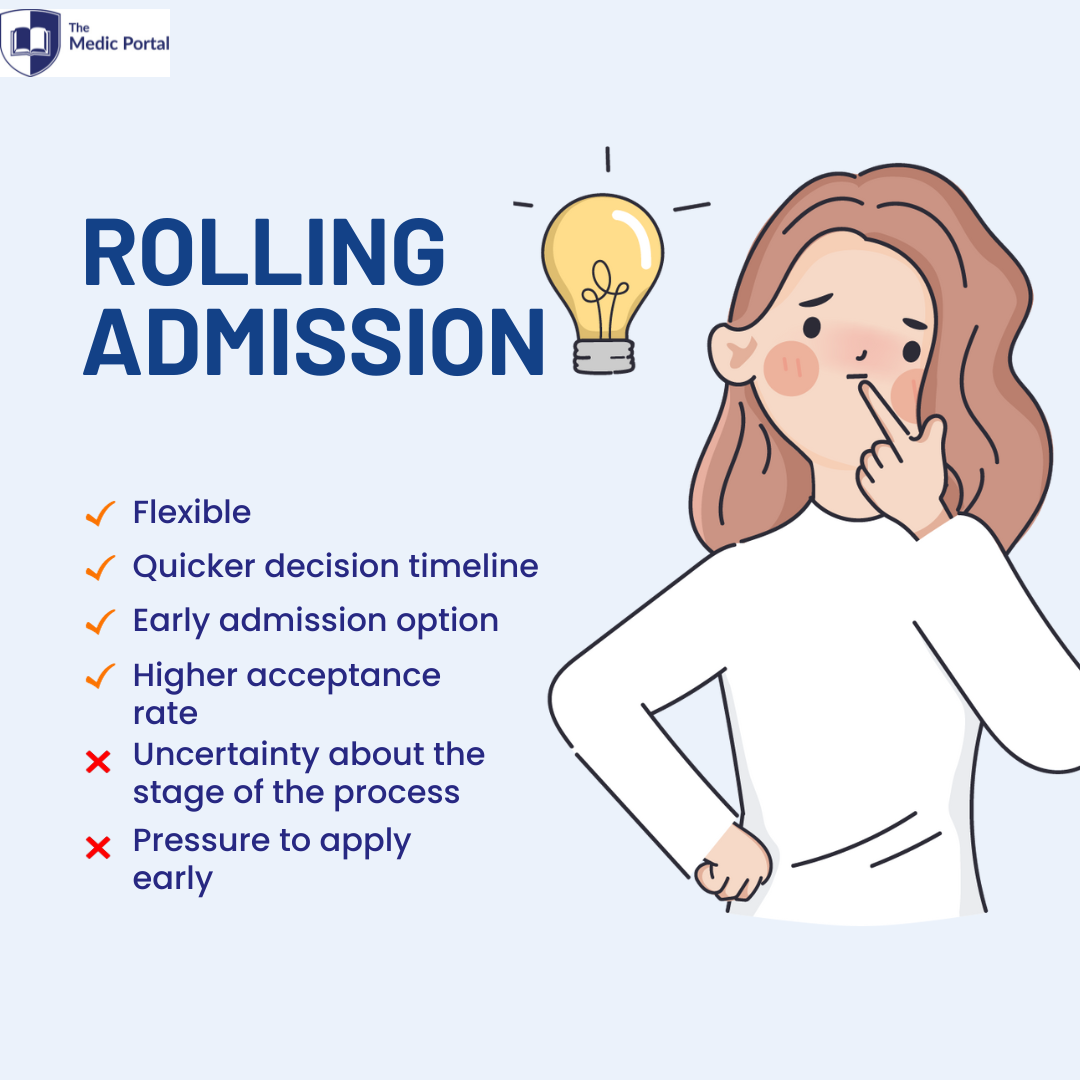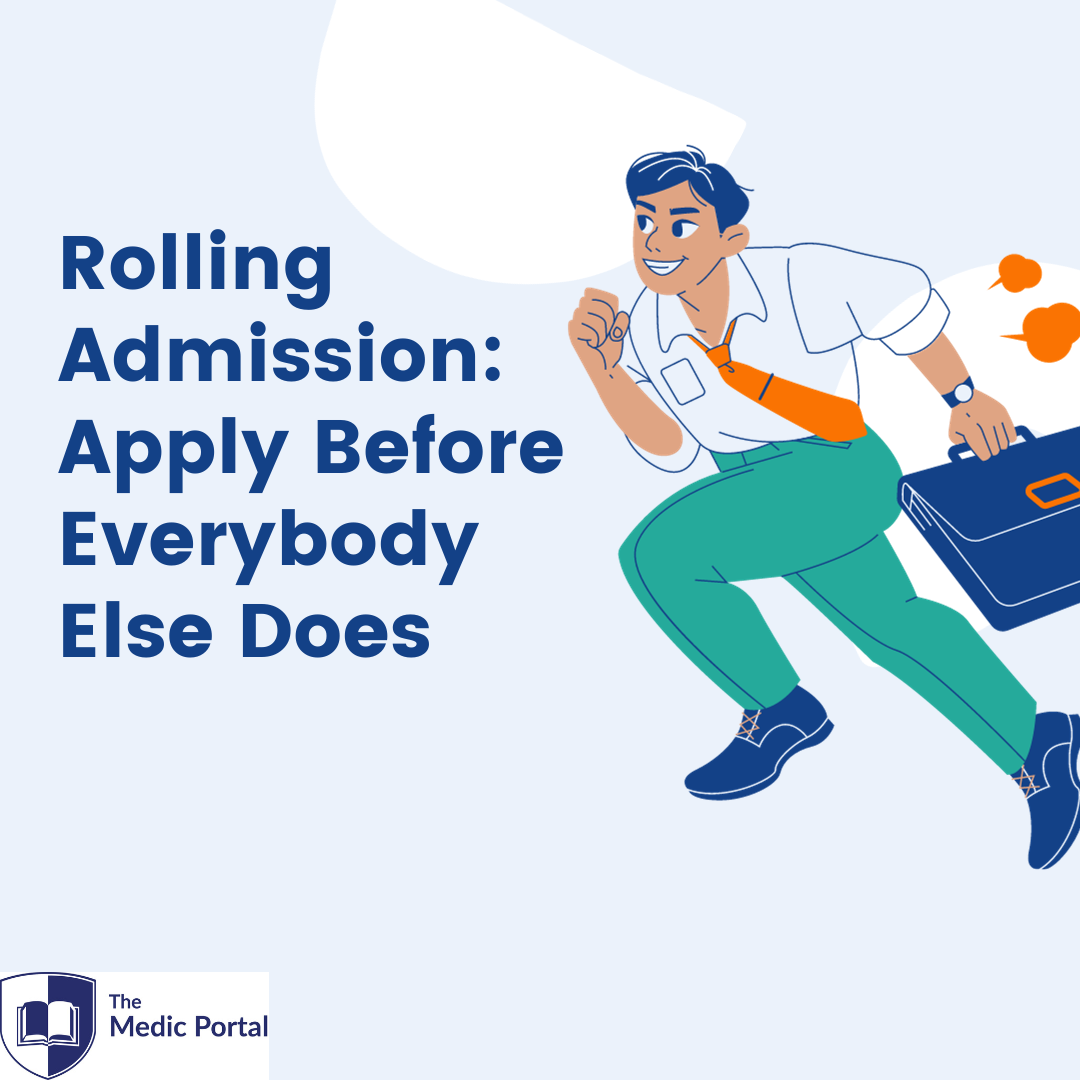What Is Rolling Admission?
Rolling admission is a policy that allows medical schools to evaluate applications as they arrive over a set duration of time rather than waiting until a specific deadline to review all applications.
Admissions committees assess and release decisions continuously, avoiding a strict cut-off date for application reviews.
Candidates can submit their applications at any time during the application window, which usually continues until the places have been filled. Given that admissions committees assess applications continuously, rolling admission often results in swift decision-making.
Prospective applicants need to thoroughly research the admission procedures of their desired medical schools, focusing on whether the institution follows a rolling admissions system or a regular decision policy.
It’s important to understand the deadlines, application systems, required forms, and necessary documentation for a complete application.
What Does Rolling Admission Mean For My Application?
It’s important to understand how rolling admission will influence your application cycle and process. Although it generally offers a more flexible timeline, each medical school might still have a priority deadline by which it is advisable to submit your application. Overall, there are a number of advantages and disadvantages to the system.

Advantages:
Rolling admission is based on a first-come, first-served basis and is a quick and flexible process. Usually, schools using a rolling admissions process reach their decisions as early as 4-6 weeks after candidates submit their applications which in turn means that students can secure their seats early.
Receiving an offer early can relieve stress, help applicants get ahead of their peers and avoid direct competition since an application is reviewed on its own merits.
Generally, rolling admissions schools do not have strict deadlines, which gives the candidates the flexibility to apply all year round and when they are ready.
Potential drawbacks:
Rolling admission works best for candidates who apply early in the admissions cycle. Since schools which follow that process fill places on a rolling basis, candidates who apply later might not find available seats. Usually, once the places are filled, admission is closed for that particular intake.
Candidates who apply late to rolling admission schools will encounter more competition, stress and time constraints in the application process during peak season.
Since places are filled on a first-come, first-served basis, various logistics such as scholarship resources and housing availability are most likely to decrease later in the application cycle.
Therefore, students are still encouraged to apply early and avoid the urge to leave the process to the very last minute. In that sense, rolling admission is not different from any other application cycle – but students do not know whether their peers have already applied to a chosen school and how many places are still available.

Tips For Applying To Rolling Admission Schools
Tip 1: Rolling admission does not mean ‘no deadline’
Although the implication of rolling admission is ‘rolling’, in reality, there tends to be a final cut-off point for applicants. You need to be aware of when the application window closes and prepare to apply early to make full use of the flexible application process.
Most likely, schools will keep sending out offers until all spaces are filled, giving you a limited amount of time to secure your spot.
Tip 2: Rolling admission is not easier than regular admission
There is a popular misconception that rolling admission is somehow easier because of its flexible nature. However, you still have to carefully prepare your application – medical schools remain selective regardless of the structure of their admission process.
Carefully craft your personal statement, prepare all required documents and try your best to achieve the desired results on your exams.
Tip 3: You have a higher chance of getting in if you apply earlier
Typically, the earlier you apply, the more spots will be available – and the less competition you’ll face. But there is a caveat – make sure the quality of your application doesn’t suffer as you rush to be among the first to submit your documents!
In the UK, the situation is generally a bit different. There is an ‘equal consideration’ deadline (16 October 2023 for 2024 Medicine entry), meaning that all applications received before this date will be considered equally. While you may still apply later, universities will only consider your application if they have available spaces.
Additional Tips: Preparing Your Application
Now that you know the key benefits of the rolling admission process, note these key tips to craft your application!
- Do your research
- Plan ahead for your exams
- Carefully prepare your application
- Apply early
Case Study: The University of Nicosia Medical School
The University of Nicosia Medical School uses a rolling admissions process for evaluating applicants for both the Doctor of Medicine (MD-6) and Graduate Entry – Doctor of Medicine Degree (GEMD) programmes. The medical school has one intake per year, which commences in mid-September and the application process normally begins in November of the preceding year.
The University of Nicosia has an online application system where applicants submit their academic transcripts. Upon review of the required documentation, eligible candidates progress to the interview stage.
Successful applicants receive an offer within 2 weeks with the opportunity to apply for a scholarship. To secure their place and reserve housing at UNIC residences, applicants must pay an administration fee stipulated in the offer.
Candidates are strongly encouraged to apply early to the University of Nicosia Medical School based on predicted grades or mid-term results. Early applications facilitate securing a place in the admission cycle, receiving scholarship decisions, arranging finances, and ensuring accommodation and other essential preparations for medical studies.
While prioritizing early applicants, the University of Nicosia also considers late applications based on seat availability.
